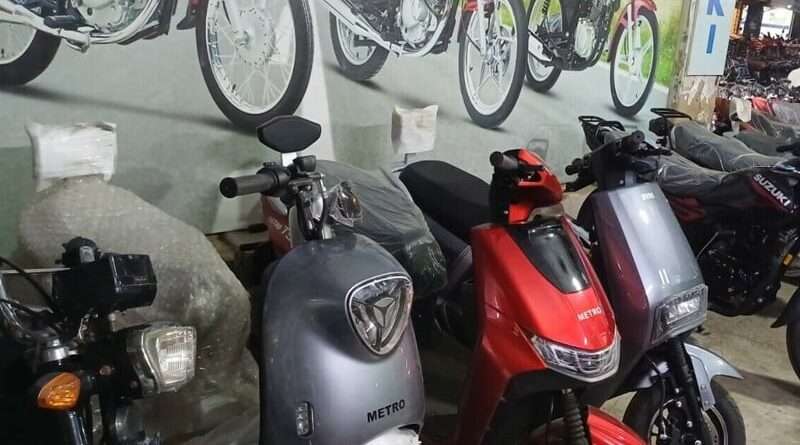E-bike Sales Set to Skyrocket: A Sustainable Revolution in Transportation
|
Getting your Trinity Audio player ready...
|
The electric vehicle (EV) industry, particularly electric motorbikes (e-bikes), is witnessing significant growth globally, and Pakistan is no exception. Despite challenges like political instability and economic downturns, e-bike sales have surged in Pakistan during 2024 and are expected to grow manifold in 2025. The upcoming New Energy Vehicle (NEV) Policy 2025 is anticipated to play a pivotal role by offering incentives, financing options, and subsidies for stakeholders, customers, and manufacturers alike. This comprehensive overview explores the trends, challenges, and future potential of e-bikes in Pakistan.
Why E-bikes Are the Future of Transportation
Eco-Friendly and Cost-Effective
Electric bikes offer a clean, green, and cost-effective alternative to traditional gasoline-powered motorcycles. As urban air quality deteriorates, e-bikes provide a practical solution for reducing pollution and health hazards. They also lower fuel costs, making them an attractive choice for everyday commuters.
Global Adoption Trends
Countries like China, Nepal, Sri Lanka, and Bangladesh have already embraced electric bikes at scale, thanks to supportive policies, advanced technologies like Graphene batteries, and government subsidies. Pakistan is now poised to follow suit with the NEV Policy 2025.
The Role of NEV Policy 2025
The forthcoming NEV policy aims to address existing challenges while fostering rapid adoption of electric motorbikes. Key features include:
Incentives for Assemblers and Consumers
- Zero-interest financing for buyers and assemblers.
- Subsidies to encourage the transition from gasoline-powered motorcycles to e-bikes.
Simplifying Registration
- Streamlined registration processes to eliminate bureaucratic hurdles.
- Empowering authorised dealers to facilitate online registrations.
Battery Technology and Recycling
- Focus on Graphene batteries, which are cost-effective, efficient, and recyclable.
- Development of battery recycling mechanisms to ensure environmental sustainability.
Challenges in the E-bike Ecosystem
Policy Gaps
The lack of a clear and consistent policy framework has deterred investment in the EV sector. Without well-defined rules, stakeholders remain hesitant to commit to large-scale projects.
Quality Concerns
The entry of substandard electric bikes into the market is undermining consumer confidence. Ensuring compliance with high-quality standards is essential for long-term growth.
Infrastructure and Financing
Limited charging infrastructure, high upfront costs, and insufficient financing options remain significant hurdles to widespread adoption.
Key Industry Insights
Growing Sales
In the financial year 2023-24, approximately 50,000 electric scooters were sold in Pakistan, compared to just 15,000 units the previous year. This growth underscores the increasing demand for e-bikes despite economic headwinds.
Localization of Parts
Local production of e-bike components is a critical factor for the industry’s success. However, progress has been slow due to delays in finalizing durable e-bike models and the lack of a supportive industrial ecosystem.
Market Opportunities
Opportunities in Pakistan’s e-bike sector include:
- Local assembly of affordable electric bikes.
- Development of EV charging networks.
- Job creation in manufacturing and maintenance sectors.
Technological Advancements in E-bikes
Graphene Batteries
Graphene batteries, widely adopted in neighboring countries, are revolutionizing the EV industry. These batteries:
- Charge faster.
- Generate less heat.
- Have better energy density.
- Are cost-effective and recyclable.
EV Innovations from China
China’s advancements in e-bike models have set a benchmark for durability, comfort, and efficiency. Pakistani manufacturers are actively assessing these models to bring similar innovations to the local market.
How the Government Can Accelerate E-bike Adoption
- Subsidies and Incentives
Offering significant subsidies and tax breaks to both manufacturers and consumers can make e-bikes more affordable. - Streamlined Processes
Eliminating bureaucratic delays in model approvals and registrations will encourage faster market penetration. - Awareness Campaigns
Educating the public about the benefits of e-bikes and addressing concerns like resale value and battery lifespan will boost consumer confidence. - Infrastructure Development
Establishing charging stations and battery recycling facilities is crucial for the long-term sustainability of the e-bike ecosystem.
E-bikes and Environmental Benefits
Reducing Urban Pollution
Replacing gasoline-powered motorcycles with electric alternatives can significantly reduce urban air pollution, aligning with Pakistan’s commitments under the Paris Agreement.
Lowering Fuel Import Costs
A shift to electric bikes will reduce dependency on fuel imports, saving valuable foreign exchange reserves.
Future Outlook: What Lies Ahead?
Expected Growth in 2025
The e-bike market in Pakistan is expected to double in 2025, driven by:
- Favorable government policies.
- Declining inflation rates.
- Rising consumer awareness and demand.
Economic and Environmental Impact
The adoption of e-bikes will create jobs, reduce transportation costs, and contribute to a cleaner environment, making it a win-win for all stakeholders.
FAQs About E-bikes in Pakistan
1. What incentives are expected under the NEV Policy 2025?
The NEV Policy 2025 is likely to offer subsidies for buyers, zero-interest financing options, and tax exemptions for manufacturers and consumers.
2. Are e-bikes more cost-effective than gasoline motorcycles?
Yes, e-bikes are cheaper to operate and maintain due to lower fuel and maintenance costs.
3. What challenges do e-bike users face in Pakistan?
Key challenges include limited charging infrastructure, high upfront costs, and concerns about resale value.
4. How can the government support e-bike adoption?
The government can provide subsidies, streamline registration processes, and develop charging and recycling infrastructure.
5. Why are Graphene batteries gaining popularity?
Graphene batteries are cost-effective, efficient, and recyclable, making them ideal for large-scale adoption in e-bikes.
SEE ALSO
https://skipper.pk/2025/01/05/psx-hits-record-high-amid-new-year-optimism/




